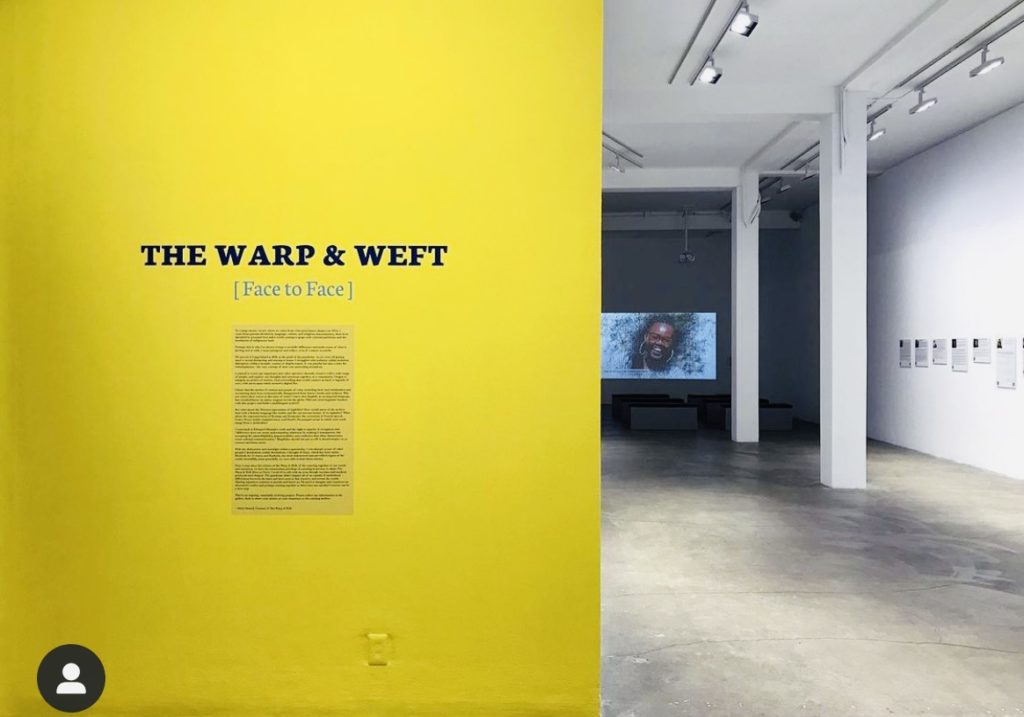
The Warp & Weft [Face to Face] at Rochester Contemporary Art Center
Multimedia Exhibition (April 1 – May 7, 2022)
To a large extent, we are where we come from. Our provenance shapes our DNA. I come from parents divided by language, culture, and religious denomination, their lives upended by personal loss and a world coming to grips with colonial partitions and the mutilation of indigenous land.
Perhaps this is why I’m always trying to straddle difference and make sense of what is jarring and at odds. I must juxtapose and reflect, even if I cannot reconcile.
We moved to Long Island in 2020, at the peak of the pandemic. As we were all getting used to social distancing and staying at home, I struggled with isolation within isolation, disruption within a broader context of displacement. It was painful but also a time for contemplation – the very concept of time was unraveling around us.
I wanted to weave my experience into other narrative threads, connect with a wide range of people, and explore our thoughts and emotions together, as a community. I began to imagine an archive of stories. Oral storytelling that would connect us back to legends of yore, with yarns spun safely around a digital fire.
I knew that the stories of women and people of color, including their oral testimonies and recounting, have been systematically disappeared from history books and archives. Why not center their voices at this time of crisis? I knew that English, as an imperial language, has wreaked havoc on native tongues across the globe. Why not cross linguistic borders with this project and build a multilingual archive?
But what about the Western expectation of legibility? How would users of the archive deal with a Semitic language like Arabic and the curvaceous beauty of its alphabet? What about the expressiveness of Bosnian and Kashmiri, the sweetness of French speech, Urdu’s Perso-Arabic sophistication, and Hindi’s Devanagari script in which each word hangs from a clothesline?
I went back to Edouard Glissant’s work and the right to opacity. It recognizes that “difference does not mean understanding otherness by making it transparent, but accepting the unintelligibility, impenetrability and confusion that often characterize cross-cultural communication.” Illegibility should not put us off, it should inspire us to connect and learn more.
With my dislocation and nostalgia within a quarantine, I was sharply aware of other people’s desolations within desolations. I thought of Gaza, which has been under blockade for 15 years, and Kashmir, the most militarized and surveilled region of the world. Incredibly, most gratefully, we were able to hear those stories.
Now, a year since the release of the Warp & Weft, of the weaving together of our words and emotions, we have the tremendous privilege of meeting in person, to share the Warp & Weft [Face to Face]. Covid-19 is still with us, even though vaccines and medical protocols have helped. The pandemic didn’t impact all of us equally. It underlined differences between the have and have-nots in this country, and across the world. Glaring injustices continue to persist and harm us. We need to imagine and construct an alternative reality and perhaps coming together to delve into one another’s stories can be a first step.
This is an ongoing, constantly evolving project. Please collect my information at the gallery desk to share your stories or your responses to the existing archive.
–Mara Ahmed, creator and curator of The Warp & Weft audio archive
Opening of The Warp & Weft [Face to Face]
Opening of multimedia exhibition on April 1, 2022 starting with an artist talk by Mara Ahmed. More information can be found at the Rochester Contemporary Art Center website.
Exhibition curated by Bleu Cease
Video design by Rajesh Barnabas
Graphic & type design by Brent Joseph
View this post on Instagram
Meet the Storytellers Behind the Warp & Weft
On April 21, 2022 Rochester Contemporary Art Center hosted a virtual conversation with The Warp & Weft writers, artists and activists. They shared their reflections about 2020 and the inspiration/process behind their stories, and helped highlight the importance of archiving diverse voices and the crucial role storytelling can play in times of uncertainty and upheaval. Speakers tuned in from Gaza (Palestine), the Gambia, Ireland, Oakland (California), Rochester and Long Island (New York).
Order of speakers:
Ashwaq Abualoof, Kaddijatou Fatty, Zoë Lawlor, Karen Faris, Erica Bryant, Quajay Donnell, Deema K. Shehabi, Selena Fleming, Darien Lamen, Rose Pasquarello Beauchamp, Ian Layton






Leave a comment